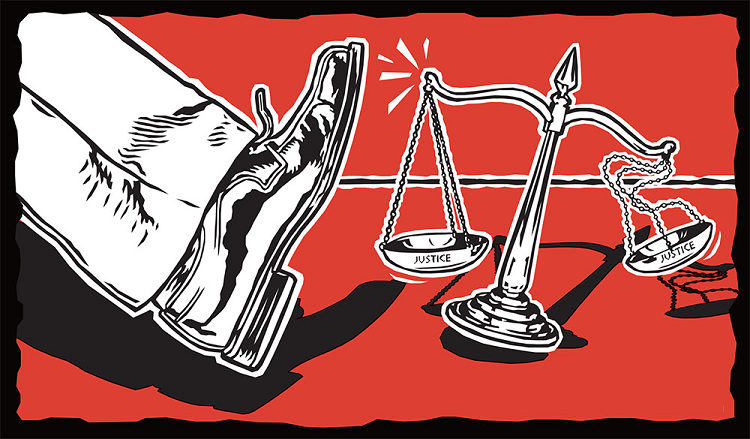

Recent judgments of the European Court of Human Rights appear to have eroded the obligation of ECHR states to protect fundamental rights in cases where the alleged violations involve an international organisation.
In the last part we saw how the European Court of Human Rights (ECtHR) has ruled that states which are signatories of the European Convention on Human Rights (ECHR) have a responsibility to ensure that their membership of international organisations does not lead to a breach of their ECHR obligations.
"...it has become evident that the overriding priority of the Court is to protect the autonomy of international organisations at the expense of the fundamental rights of their staff (and other individuals adversely affected by the acts of such organisations)."In other words, ECHR signatory states must ensure that adequate provision is made for an "equivalent protection" of fundamental rights inside any international organisation which they join.
This has implications for the internal justice systems of international organisations on which staff are obliged to rely for legal redress, because of their lack of access to national courts.
According to the "Waite and Kennedy v. Germany" judgment, such internal justice systems must provide staff of an international organisation with "reasonable alternative means to protect effectively their rights under the [European] Convention [on Human Rights]".
However, following the delivery of ECtHR judgments in the cases of Klausecker v. Germany (application no. 415/07) and Perez v. Germany [PDF] (no. 15521/08) in January 2015, it has become evident that the overriding priority of the Court is to protect the autonomy of international organisations at the expense of the fundamental rights of their staff (and other individuals adversely affected by the acts of such organisations).
"There was now a distinct possibility that international organisations and their member states could get away with applying a different and less rigorous standard of human rights protection to the acts and omissions of an international organisation."The Klausecker and Perez judgments prompted the legal scholar Anne-Marie Thévenot-Werner to express concern about an erosion of the obligation of states to protect the fundamental rights enshrined in the ECHR.
In an article published in the legal journal Revue de droit allemande in 2015 Thévenot-Werner acknowledged that the ECtHR had formally reaffirmed its case law requiring the provision of "reasonable alternative means" for the protection of fundamental rights inside international organisations.
However, at the same time the Court signalled that it would not hold a state to account for a breach of the ECHR involving an international organisation unless the protection available via the organisation's internal justice system was shown to be “manifestly deficient”.
Thévenot-Werner warned that the approach taken by the Court in these cases risked creating a loophole with respect to the protection of fundamental rights enshrined in the ECHR.
"It deserves to be emphasised at this point that these are matters which are not merely of academic and theoretical interest."There was now a distinct possibility that international organisations and their member states could get away with applying a different and less rigorous standard of human rights protection to the acts and omissions of an international organisation. In such situations, states would only be called to account if it could be established to the satisfaction of the Court that the level of protection available was “manifestly deficient”.
The risk of such an erosion of legal protection exists even in the case of organisations where all participating states are signatories to the ECHR (which is the case for the EPO).
It deserves to be emphasised at this point that these are matters which are not merely of academic and theoretical interest.
The saga of Benoît Battistelli's "Strike Regulations" at the EPO provides a striking illustration of their practical significance for the staff of international organisations.
"The Gerechtshof judgment showed that at least some judges in the Netherlands were serious about setting limits to the “immunity” enjoyed by an international organisation in order to prevent abuses involving clear-cut violations of fundamental rights."As noted in an earlier part of this series, Battistelli's controversial "Strike Regulations" were one of a long litany of grievances which the EPO staff union SUEPO attempted to litigate before the national justice system in the Netherlands.
During the litigation procedure, the Gerechtshof den Haag (Appeal Court of The Hague) decided that breaches of fundamental rights by EPO management were so severe that they justified lifting the organisation’s immunity from jurisdiction.
This lead to a judgment, delivered on 17 February 2015, in which the Gerechtshof ordered the EPO [PDF] to rescind several amendments to the organisation’s staff regulations, including the undue restrictions on industrial actions imposed by the impugned “Strike Regulations”.
In addition to this, the EPO was ordered by the court to uphold the rule-of-law and social dialogue standards in line with the European Convention on Human Rights and ILO Conventions No. 87, on the right to organise in trade unions, and No. 98 on the right to collective bargaining. [PDF]
The Gerechtshof judgment showed that at least some judges in the Netherlands were serious about setting limits to the “immunity” enjoyed by an international organisation in order to prevent abuses involving clear-cut violations of fundamental rights.
The European Public Service Union (EPSU) reported on the judgment under the headline "European Patent Office does not live in a Dutch no man's land".
"The problem with the Gerechtshof judgment was that it set a worrying precedent which had political ramifications going far beyond the EPO."Unfortunately, both SUEPO's legal victory and EPSU's optimism turned out to be short-lived.
Less than two years later, the Gerechtshof judgment was set aside, thereby confirming what many had long suspected: the European Patent Office does indeed live in a Dutch no man's land!

An independent judicial review of violations of fundamental rights by the EPO carried out by the Gerechtshof den Haag led to a short-lived lifting of the organisation's immunity in February 2015. This was overruled in January 2017 when the Supreme Court proclaimed that Dutch courts had "no jurisdiction in the EPO dispute".
"The Hoge Raad attempted to justify its findings on the basis that the fundamental rights of EPO staff "were sufficiently protected by the internal dispute settlement procedure provided for by EPOrg"."It was a veritable thorn in the flesh not only for Battistelli and his clique at the EPO, but also for the Dutch government which reaps significant economic benefits from the country's status as a host to a large number of international organisations.
This led to the Dutch government joining forces with Team Battistelli in support of an application for “cassation” of the judgment.
Finally, on January 2017, the Hoge Raad (Supreme Court of the Netherlands) issued a ruling to the effect that Dutch courts had no jurisdiction in the EPO dispute:
"According to the European Court of Human Rights (ECtHR), granting jurisdictional immunity to an international organisation constitutes a limitation of the right of access to a court as referred to in article 6 of the Convention for the Protection of Human Rights and Fundamental Freedom Rights (ECHR). This limitation is acceptable provided that litigants have a reasonable alternative means of protecting their rights effectively.
The Supreme Court found that such alternative means exist. The rights of VEOB [the Netherlands branch of SUEPO] and SUEPO are sufficiently protected by the internal dispute settlement procedure provided for by EPOrg, under which individual employees and staff representatives can ultimately take their complaint to the Administrative Tribunal of the International Labour Organization in Geneva. According to the Supreme Court, this means that the essence of their right of access to a court has not been impaired."
"In the upcoming parts, we will take a closer look at the EPO's internal justice system and the role which it played in "Strike Regulations" affair."Not everybody would agree. Indeed, many would argue that the facts tell a very different story and that the judgment delivered by the Hoge Raad in January 2017 was driven by political expediency and a misplaced desire to tell the Dutch government and the EPO what they wanted to hear rather than what they needed to hear.
In the upcoming parts, we will take a closer look at the EPO's internal justice system and the role which it played in "Strike Regulations" affair.
In particular, we will see how a former judge of the European Court of Human Rights played a bizarre and incongruous role in prolonging the suppression of the fundamental right to "freedom of association" at the EPO. ⬆